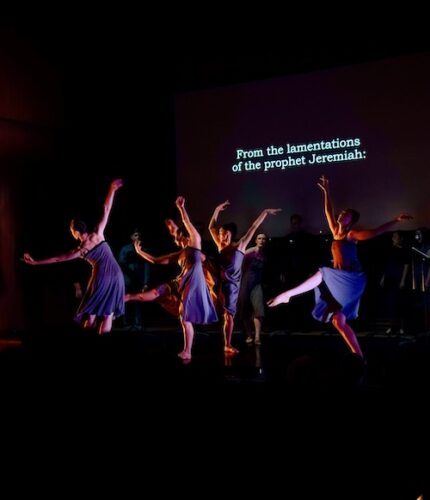Dance and voice contrast affectingly in Chicago a cappella’s “Lamentations”

Chicago a cappella’s artistic enterprise has taken the vocal ensemble and its receptive audience in directions that effectively blur the distinctions between musical genres, styles and sensibilities, across the centuries.
The group’s season opener Friday evening in Allen Recital Hall at DePaul University’s Holtschneider Performance Center, added another such venture to the list—its first-ever collaboration with a ballet company.
The program, curated and exactingly prepared by music director John William Trotter, was built around the literature of lamentation—music that encapsulates the search for “meaning and comfort in the face of the tragic circumstances of life” but also that “helps us celebrate what we most value,” as he observed in his program note.
That seems an accurate description of the two sets of Lamentations of Jeremiah by the English Renaissance master Thomas Tallis that formed the centerpiece of Friday’s time-traveling exploration of musical longing, loss, despair and consolation. Joining the ensemble for the Tallis was the all-female Chicago dance company Ballet 5:8, performing apposite choreography by its artistic director, Julianna Rubio Slager.
Cramming five dancers and ten singers onto a single tiny stage might have seemed an invitation to disaster but the result in fact proved quite the contrary. The dancers were confined to a narrow strip of stage in front of the row of vocalists. While this arrangement precluded any real spatial depth, dance movement complemented the musical performance to remarkably moving effect.
Just as the mournfulness of Tallis’ Latin settings from the Old Testament was enhanced by Chicago a cappella’s acute purity of sound, smoothness of blend and chaste spirituality, the equally seamless lines of Rubio Slager’s choreography added a satisfying layer of corporeal expressivity.
While the music moved with a timeless sense of abandonment and desolation, the dance element was far more “active”: as the voices appealed for Jerusalem to repent, a single dancer extended supplicating arms amid motionless figures crumpled to the floor. At other moments the movement vocabulary— torsos tilted and twisted with grief, backs and legs arched in pain, bodies borne as if in a funeral procession—illuminated the music without slavishly mirroring its imagery. A remarkable sense of intimate grieving pervaded the whole.
There will be alternating sets of dancers for the remaining three performances; Friday’s quintet was excellent, as were the singers.
Excellent was also the word for the vocal performances on the first half of the program.
While the lack of resonance in the 140-seat hall put motets by Palestrina and Victoria at a slight disadvantage, the acoustic made certain that one caught every word clearly in fare ranging from traditional folk songs in flavorsome arrangements by Trotter, to Russian Orthodox hymnody by Pavel Chesnokov, to pieces by living composers Sarai Hillman and Saunder Choi.
The most striking of the contemporary works was Hillman’s Refuge and Safety, a setting of Psalm 59 that is part of a larger collection of vocal pieces based on biblical texts. Hillman, a winner of the group’s successful (and now widely imitated) HerVoice competition and mentorship program in 2021, layers overlapping sustained and single notes, playing with repeated, aspirated phrases to evoke a vivid sense of introspective unreality. Wonderfully precise of ensemble, the pitch-perfect singers were fully inside the music (sans conductor, as they were throughout the concert), making one eager to hear Hillman’s collection in its entirety.
The program will be repeated 3 p.m. Sunday at Nichols Concert Hall, Evanston; 7:30 p.m. Oct. 5 at Grace Episcopal Church, Oak Park; and 4 p.m. Oct. 6 at Wentz Concert Hall, Naperville. chicagoacappella.org
Posted in Performances


